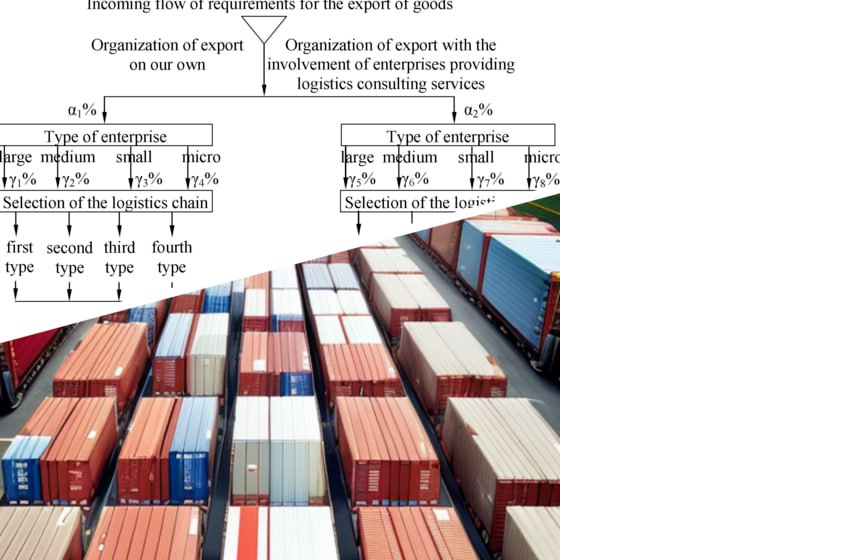Construction of a simulation model of goods delivery in international road transportation taking into account the functioning efficiency of logistics supply chain
DOI:
https://doi.org/10.15587/1729-4061.2023.280886Keywords:
supply chain, simulation model, logistics consulting, foreign trade operation, export of goods, intermediary servicesAbstract
The object of this study is the process of goods delivery in international road transport using various types of logistics chains.
The problem being solved is due to the need to develop recommendations for exporters of goods to reformat or design new supply chains during wartime. The expediency of organizing foreign trade operations by the cargo owners' own forces or with the involvement of enterprises providing logistics consulting services is considered.
A simulation model of goods delivery in international road traffic was built and implemented in the GPSS World simulation automation package.
The model involves the optimization of organizational and technological processes related to the activity of both a separate link and the entire supply chain. The study takes into account the components of the time characteristics of the performance of preparatory work when establishing cooperation with institutions and organizations, as well as the direct service of the exporter. The application of the developed model in practical activities will provide an opportunity for exporters to obtain information about the duration and reliability of the stages of a foreign trade operation and the feasibility of involving consulting enterprises in cooperation. At the same time, the simulation results reflect the performance indicators of the proposed supply chains when delivering goods by road transport along various routes. The proposed simulation model will make it possible to reduce the time spent searching for links in the formation of a supply chain by 8–12 %, and the duration of a foreign trade operation by 10–14 %. Thus, the reliability of cooperation with intermediary organizations will increase by 8–11 %
References
- Pudycheva, H. O., Tsurkan, S. M., Malyshko, V. S. (2017). Vplyv lohistyky na konkurentospromozhnist pidpryiemstva. Teoretychni, metodolohichni ta praktychni aspekty konkurentospromozhnosti pidpryiemstv. Odessa: Atlant, 191–198. Available at: http://dspace.oneu.edu.ua/jspui/handle/123456789/7199?locale=en
- Nahorniy, Y., Оrda, O., Kondratenko, D. (2020). Selection of the optimal technology for cargo delivery in international traffic. Automobile Transport, 47, 44–50. doi: https://doi.org/10.30977/at.2219-8342.2020.47.0.44
- Polyanska, A. S., Martynets, V. B., Kaban, O. V. (2022). Optimization of the supply chain at the enterprise in the conditions of crisis. The Actual Problems of Regional Economy Development, 2 (18), 112–127. doi: https://doi.org/10.15330/apred.2.18.112-127
- Nakonechna, T., Prokopenko, K., Semenova, A. (2020). Logistics consulting as a tool to improve the efficiency of business processes. Scientific Notes of Taurida National V.I. Vernadsky University. Series: Economy and Management, 31 (70 (6)), 124–131. doi: https://doi.org/10.32838/2523-4803/70-6-21
- Volpe Martincus, C., Carballo, J., Graziano, A. (2015). Customs. Journal of International Economics, 96 (1), 119–137. doi: https://doi.org/10.1016/j.jinteco.2015.01.011
- Khalipova, N., Bosov, A., Prohoniuk, I. (2018). Development of a model for the integrated management of the international delivery chains formation. Eastern-European Journal of Enterprise Technologies, 3 (3 (93)), 59–72. doi: https://doi.org/10.15587/1729-4061.2018.132683
- Elliott, D., Bonsignori, C. (2019). The influence of customs capabilities and express delivery on trade flows. Journal of Air Transport Management, 74, 54–71. doi: https://doi.org/10.1016/j.jairtraman.2018.09.007
- Park, Y.-B., Kim, H.-S. (2016). Simulation-based evolutionary algorithm approach for deriving the operational planning of global supply chains from the systematic risk management. Computers in Industry, 83, 68–77. doi: https://doi.org/10.1016/j.compind.2016.09.003
- Fanti, M. P., Iacobellis, G., Ukovich, W., Boschian, V., Georgoulas, G., Stylios, C. (2015). A simulation based Decision Support System for logistics management. Journal of Computational Science, 10, 86–96. doi: https://doi.org/10.1016/j.jocs.2014.10.003
- Martagan, T. G., Eksioglu, B., Eksioglu, S. D., Greenwood, A. G. (2009). A simulation model of port operations during crisis conditions. Proceedings of the 2009 Winter Simulation Conference (WSC). doi: https://doi.org/10.1109/wsc.2009.5429245
- Li, J., Chan, F. T. S. (2013). An agent-based model of supply chains with dynamic structures. Applied Mathematical Modelling, 37 (7), 5403–5413. doi: https://doi.org/10.1016/j.apm.2012.10.054
- Statistica 13.3. Computer program. Serial number JRR709H998119TE-A.
- GPSS World Reference Manual (2001). Holly Springs.

Downloads
Published
How to Cite
Issue
Section
License
Copyright (c) 2023 Ievgenii Lebid, Nataliia Luzhanska, Iryna Lebid, Alexander Mazurenko, Inesa Halona, Anatolii Horban, Iryna Mykhailenko, Ievgen Medvediev, Tetiana Sotnikova

This work is licensed under a Creative Commons Attribution 4.0 International License.
The consolidation and conditions for the transfer of copyright (identification of authorship) is carried out in the License Agreement. In particular, the authors reserve the right to the authorship of their manuscript and transfer the first publication of this work to the journal under the terms of the Creative Commons CC BY license. At the same time, they have the right to conclude on their own additional agreements concerning the non-exclusive distribution of the work in the form in which it was published by this journal, but provided that the link to the first publication of the article in this journal is preserved.
A license agreement is a document in which the author warrants that he/she owns all copyright for the work (manuscript, article, etc.).
The authors, signing the License Agreement with TECHNOLOGY CENTER PC, have all rights to the further use of their work, provided that they link to our edition in which the work was published.
According to the terms of the License Agreement, the Publisher TECHNOLOGY CENTER PC does not take away your copyrights and receives permission from the authors to use and dissemination of the publication through the world's scientific resources (own electronic resources, scientometric databases, repositories, libraries, etc.).
In the absence of a signed License Agreement or in the absence of this agreement of identifiers allowing to identify the identity of the author, the editors have no right to work with the manuscript.
It is important to remember that there is another type of agreement between authors and publishers – when copyright is transferred from the authors to the publisher. In this case, the authors lose ownership of their work and may not use it in any way.








